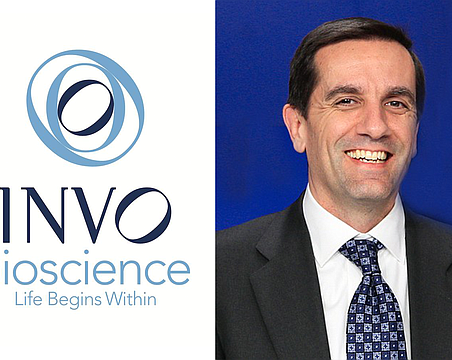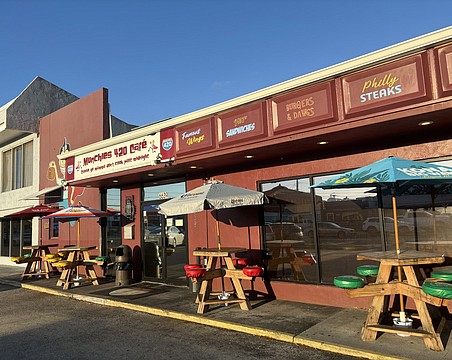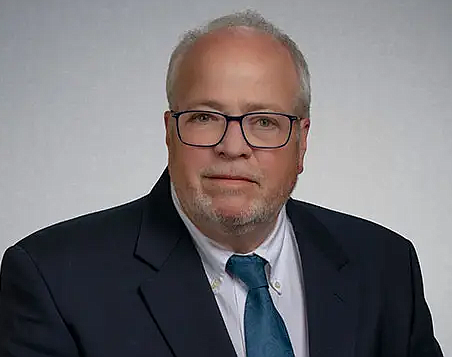Patents Pending
A larger USF licensing office is positioned to capitalize on laboratory breakthroughs that could create new Bay area tech companies.
By Francis X. Gilpin
Associate Editor
Florida State University has its cancer fighter. The University of Florida has its sports drink.
"Obviously, we haven't had our Taxol or our Gatorade yet," says Valerie Landrio McDevitt, the University of South Florida's director of patents and licensing. "We haven't had our big hit."
But it may just be a matter of time. If USF researchers do discover a future wonder drug or instantly recognizable consumer product, there is a good chance you will hear about it. The university and the local economy might be able to take advantage, too.
That hasn't always been the case at USF.
The push is on to commercialize more of the research coming out of USF laboratories. Local business and political leaders want the Tampa Bay area to become an incubator of high-technology startups that might one day grow into Fortune 500 companies. That's particularly true in the life sciences.
For that to happen, USF must take the lead.
One measure of a university's performance at this early stage is how much it collects in technology licensing fees. USF was 16th among 38 research schools doing that in the Southeast, according to the latest survey by the Association of University Technology Managers. The annual survey, which came out in December and covers the 2002 fiscal year, shows USF brought in almost $1.5 million in license income.
The Tampa-headquartered metropolitan university was dwarfed by FSU and the University of Florida, which finished one-two in the Southeast.
FSU had 2002 licensing fees of $52 million, boosted by royalties from Taxol. The anticancer drug, discovered by Professor Robert Holton and first marketed by Bristol-Myers Squibb Co. a decade ago, has treated more than 500,000 patients.
A good chunk of UF's nearly $31.6 million in licensing income can be attributed to Gatorade, the beverage of choice for sweaty athletes developed nearly 40 years ago by kidney-disease specialist Robert Cade. The drink is sold by PepsiCo's Quakers Oats Co.
"Some of the greatest stories come out of Florida," says McDevitt.
Perhaps USF's most important discovery to date, a double transgenic mouse model for Alzheimer's disease, isn't as sexy. But Karen Duff, John Hardy and other USF researchers have made great strides in the study of aging-related brain impairment. Their advance is an easier and quicker way to induce the disease's pathology in mice so that memory loss can be studied and possibly a drug treatment found.
Until recently, USF wasn't fully prepared to exploit such discoveries for the greater benefit of its coffers and the Bay area economy.
Organized outreach to faculty was limited, says McDevitt, who was a patent attorney at drug and eyewear maker Bausch & Lomb Inc. before going to work in USF's expanding research office. Some scientists need encouragement to make a disclosure, or formal request for their findings to be evaluated for patent-worthiness and commercial potential. The procedure can be a hassle, lead nowhere, and sometimes distract researchers from their primary work.
It's a good thing there weren't more professors coming to USF administrators looking for invention disclosure forms. "There were just a few people in this office," says McDevitt. "We had a backlog." Her first task when she arrived was to whittle down a pile of unprocessed disclosure paperwork.
About the same time, licensing income was actually declining. USF brought in just $1.2 million during fiscal 2003. Still, a few years earlier, the university struggled to break the $1 million plateau at all.
Mostly caught up with the disclosure backlog now, the beefed-up USF research office is holding more in-house seminars to tell professors about the virtues of making disclosures. "The faculty are wonderful to work with. Faculty are great," says McDevitt, who holds a master's degree in chemistry. "They're used to explaining their ideas. They're excited about it."
They cannot be too disappointed when they hear about the generous terms that USF offers them, if they wish to pursue a patent. USF shares 45% of whatever the university earns in royalties with inventors, who can use up to 10% of their cut for research expenses that federal grant-makers usually won't cover.
The university is on a pace to report a record total of disclosures for the fiscal 2004, according to McDevitt. At mid-year, there had been 68. "The number of disclosures is going up substantially," says McDevitt.
There were 94 disclosures for all of last fiscal year. The USF patent office also obtained 22 patents, including several for work being done by John Hadden to diagnose, monitor and control immune deficiencies.
The university is building an 87-acre research park at a cost of $40 million to house its scientists and entrepreneurs, working mainly in fields of biotechnology and homeland security.
Rod Casto, an entrepreneur in the pharmaceutical industry, joined USF as associate vice president of economic development last summer. Casto, McDevitt and other USF officials have as their goal to double licensing income by fiscal 2007.
Achieving that mark is complicated by concerns about federal budget deficits in Washington, D.C.
U.S. Rep. C.W. Bill Young, R-Indian Rocks Beach, chairman of the House Appropriations Committee, has managed to funnel more federal research dollars to USF in recent years.
In fiscal 2002, USF received $212.8 million in funding for sponsored research. That contrasts with the more than $1 billion that came the way of the three universities in North Carolina's Research Triangle.
But Congress is expected to go along with the Bush administration's desire to slow research spending. For 2005 through 2008, President George W. Bush has proposed yearly appropriation increases of less than 3% for the National Institutes of Health and the National Science Foundation, the two biggest providers of research funding for university labs.
Southeast universities,
2002 research funds and results
PatentsStartups
InstitutionSponsored researchissuedformed
North Carolina State University$478,613,713415
Duke University$404,488,000453
University of Florida$369,246,830625
Georgia Institute of Technology$344,198,686408
University of Alabama Birmingham$326,415,51128NA
University of Georgia$284,660,000334
University of North Carolina Chapel Hill$275,368,185273
University of Virginia$257,079,393173
Emory University$250,719,041254
Virginia Polytechnic Institute$232,560,000246
Vanderbilt University$231,300,000261
University of Miami$226,300,00020
University of South Florida$212,774,737161
Mississippi State University$158,652,00092
Florida State University$154,705,048152
Clemson University$134,840,00030
University of Kentucky$127,662,744323
Tennessee Board of Regents$123,475,00010
University of South Carolina$123,108,0003NA
Medical University of South Carolina$118,418,50260
Auburn University$108,775,00044
Wake Forest University$107,500,00090
Tulane University$102,998,00080
University of Louisville$87,636,00012
University of Arkansas for Medical Sciences$85,868,900163
University of Arkansas Fayetteville$80,427,312172
Virginia Commonwealth University$74,081,000110
University of Central Florida$66,351,000182
University of Mississippi$66,164,93031
Louisiana State University$52,825,977100
George Mason University$52,651,21910
Florida Atlantic University$50,052,59631
Medical College of Georgia Research Institute$48,200,000120
Florida International University$47,700,00010
Eastern Virginia Medical School$32,468,35230
University of South Alabama$18,533,41340
University of North Carolina Charlotte$15,328,22604
East Carolina University$11,520,00011
Source: Association of University Technology Managers
Southeast universities,
2002 technology licensing
Income-Income
Licenseproducingper
Institutionincomelicenseslicense
Florida State University$52,077,12016$3,254,820
University of Florida$31,597,753102$309,782
Emory University$29,557,91742$703,760
Wake Forest University$17,878,92014$1,277,066
Vanderbilt University$11,881,16054$220,021
Tulane University$11,642,80323$506,209
Duke University$4,542,221129$35,211
Clemson University$4,001,6568$500,207
University of Virginia$3,816,17181$47,113
North Carolina State University$3,720,00078$47,692
University of Georgia$3,537,82987$40,665
University of Alabama Birmingham$2,427,075NANA
Virginia Polytechnic Institute$2,348,68060$39,145
Georgia Institute of Technology$2,142,31963$34,005
University of Kentucky$1,500,00024$62,500
University of South Florida$1,479,58027$54,799
Louisiana State University$1,447,78413$111,368
University of North Carolina Chapel Hill$1,247,55678$15,994
Virginia Commonwealth University$1,203,12730$40,104
Medical University of South Carolina$743,01713$57,155
University of Mississippi$530,0006$88,333
Eastern Virginia Medical School$479,5704$119,893
University of Arkansas Fayetteville$341,75128$12,205
Mississippi State University$324,36810$32,437
University of Miami$293,83722$13,356
University of Central Florida$279,0289$31,003
University of Arkansas for Medical Sciences$226,34122$10,288
Auburn University$188,06012$15,672
East Carolina University$149,0315$29,806
Medical College of Georgia Research Institute$136,91611$12,447
University of South Alabama$89,9537$12,850
Florida Atlantic University$87,9504$21,988
University of North Carolina Charlotte$74,5007$10,643
University of South Carolina$59,1055$11,821
University of Louisville$37,4265$7,485
George Mason University$13,4235$2,685
Florida International University$11,6171$11,617
Tennessee Board of Regents$11,0002$5,500
Source: Association of University Technology Managers





